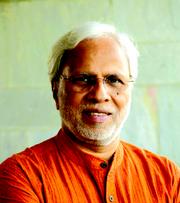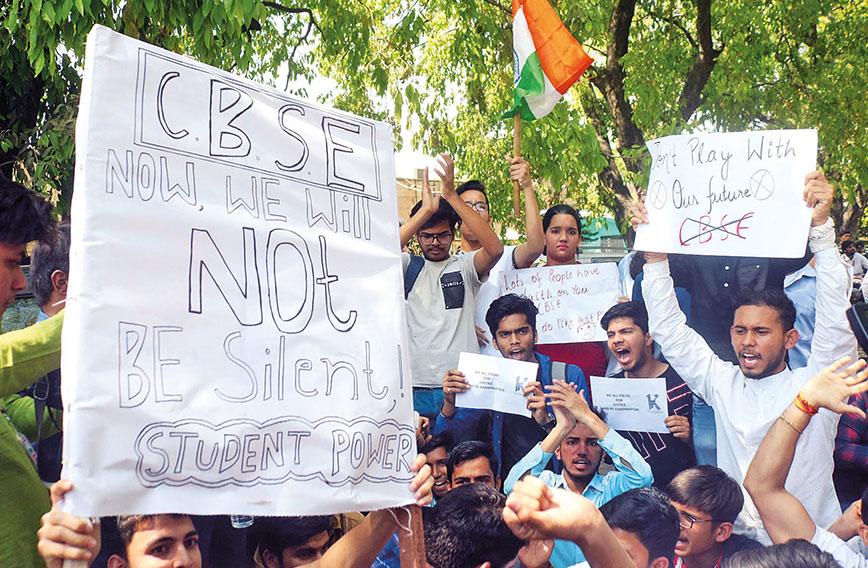
DILEEP RANJEKAR
In our beloved nation, a culture exists to comment, react, debate, criticise and suggest quickfixes without knowing the deeper nature of a problem or making an attempt to analyse its root causes.
It was so once again during the recent episode of leaking out of the examination papers of the Central Board for Secondary Education (CBSE) exam. Newspapers and TV shows were full of sensationalised debates with people freely commenting on the leak and the possibility of a re-examination. Those with a vested interest took this as an opportunity to score political points. In the midst of the cacophony, parents and students had the most genuine responses. Their anguish was real and, for me at least, very revealing of the fragility of both our examination and education system.
The students said that, if the re-examination was held, they would have to prepare all over again and the tempo that they had built and the hard work they had put in to prepare would be lost. Many of them were not at all confident that they would be able to perform with the same (expected) success! Their comments brought home the weak foundations of their learning and the superficiality of our examination system. What the students were saying was: “Now that we have reproduced what we studied / remembered, we won’t be able to write another examination because we are done with it.” What this means is that education is equal to studying something, remembering it and reproducing it during the examination. While I do fully understand the anxiety of the students and parents, it deeply reflects our national attitude towards examinations.
Education is being equated with the ability to write exams, notch up high scores, get admission to institutions with high brand value and secure high-paying jobs. Thus, education is merely an instrument to achieve higher economic strength, status and power in society. And these are students from schools affiliated to one of the most aspirational educational boards in the country and is regarded as better than other boards in its curriculum, textbooks, methodology and preparation of students.
At the state level, it is not uncommon for exam papers to leak. So much so that these leaks often go unreported. ‘Large-scale copying’ is also rampant and happens in varying degrees especially in less supervised territories. There are instances of answers being put up on a board at examination centres — which lends a whole new meaning to ‘board examination’!
The issue really is not just how the papers leaked or who is responsible or whether we should be making such a huge fuss over exam paper leaks, but how we should view the assessment of student learning. This is the issue that needs radical review. In plain and simple words, we have to do away with the current unscientific and draconian system of examinations. We have to do away with one-time, completely summative assessment of students.
Learning assessment has at least two powerful objectives — (a) helping students develop and (b) helping teachers understand how their teaching strategies are working to contribute to student development! The primary purpose of any form of assessment is to know whether the objectives of the curriculum are being achieved. Just summative, one-time, mechanical examination not only does not achieve this purpose but leads to promoting a culture of learning by rote.
There are important issues such as design, frequency and method of assessment that significantly influence the culture of assessment among schools, teachers, students and parents.
The design must ensure that the comprehensive objectives of the education curriculum such as conceptual clarity, higher order thinking (leading to independence of thinking), scientific temper, critical thinking, sensitivity, empathy, respect for others, promotion of constitutional values (socialism, secularism, democracy) and national cohesion are included as important factors to assess. These are mandated by the National Education Policy and not optional. The current design encourages merely rote memorisation and in some proportion, application of learning. Very rarely does the design address the other curricular objectives.
Frequency of assessment must be such that it adheres to the basic purpose of student development. And development is a continuous process — not a one-time event to label a student’s status of learning. The continuous comprehensive evaluation prescribed by the Right to Education Act is based precisely on this principle. However, we have introduced this sophisticated concept without preparing our teachers for it. As a result, they view it as an additional burden. We are completely ignoring the reality that a particular student may not perform well at a given point of time but would have learnt all the same.
Method of assessment envisages taking students into confidence and creating the most non-threatening environment for monitoring student development. The current examination method is an antithesis of this principle, leading to so much stress / fear that many students run away or, in extreme cases, even commit suicide. I am also not clear on one question — are we trying to understand how much the student has learnt or do we want to test how much a student can reproduce in three hours? There are also issues such as the logic behind three hours for a 100-marks examination and two hours for a 50-marks paper. This has led to the rise of coaching ‘factories’ which are training students to “crack the exams” rather than ensuring deeper learning.
A student’s future has come to depend on success in the board exams. As a result, students, teachers and parents are willing to do anything to score better — including resorting to malpractices. In a society where “corruption” is widely accepted, unscrupulous elements are bound to thrive. An honest and efficient head of the CBSE board will not be able to make a difference.
The New Education Policy, which is in the making, must address the assessment and examination system in its entirety. The leak is really no more than a sensational story — not much different from debates that started upon actor Sridevi’s sudden passing away in Dubai. We need to go much beyond drawing room conversations and sound bites.
Unfortunately, education doesn’t get the serious public attention it deserves. Being in the education field for about 20 years, it is not unusual for reporters to ask me for my views on the Union or state education budgets. In the initial years I took great pains to provide in-depth analysis; then I realised that it was futile to do so for many reasons. Budgets come and go every year, what matters is what happens to the programmes announced under the budgets and how well or meaningfully the funds get spent.
So I have stopped giving my reactions and now reporters don’t ask for my comments. With examinations, too, I feel we need to raise the level of discussion and go beyond leaks to reform the entire system.
Dileep Ranjekar is CEO of the Azim Premji Foundation
Comments
Currently there are no Comments. Be first to write a comment!




